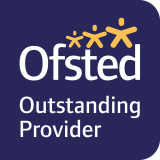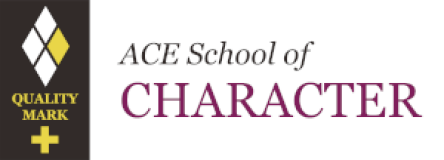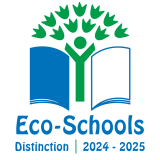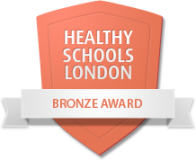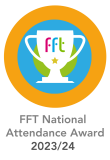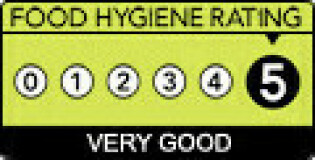Curriculum Map and Intent Overview
OUR CONTEXT
Prior to the pandemic our community was one of the most disadvantaged in London. It has the highest index of multiple deprivation (IMD) and the highest score for lack of attainment and skills in London. We also have a rapidly changing demographic where in 2010 our intake was 35% White British but in 2023 our intake of White British is now less than 10%.
The pandemic made our existing challenges even greater, and had a significant effect on our community: Barking Abbey featured on Sky News in December 2020 (COVID-19: Nearly half of pupils at Barking Abbey School off because of coronavirus | UK News | Sky News). There are now severe Mental Health concerns from large numbers of pupils, a huge increase in use of food banks and a large effect on literacy, with our upcoming cohorts at least 1 year behind the chronological reading age.
At the same time, we have an increasingly aspirational community who recognise the vital importance of a good education.
OUR CURRICULUM “GOLDEN THREADS”
-
Addressing low Literacy - everyone at least at their chronological reading age.
-
Closing the Aspiration Gap - all pupils succeeding and wanting to succeed.
-
Overcoming Deprivation - ensuring no child is left behind.
CURRICULUM INTENT
Our aim at Barking Abbey is to enable students to achieve their best and to allow the widest range of career and further education opportunities to remain open, up to and beyond the school leaving age. Teaching and Learning is built around the “B.A. Way” (see Figure 1) and the BEST characteristics (see Figure 2) which drive our core values. Character Education is at the forefront of what we do, encouraging resilience that will help pupils to cope with choices and overcome the challenges they are likely to encounter in life. We were awarded the Kitemark Plus for Character Education in 2022: The Future’s So Bright - You Gotta Wear Shades! - BDSIP.
“Leaders have set high expectations for all pupils by establishing the ‘best habits’ framework for learning and character”.
Our curriculum is ambitious. The School appointed a Director of Aspiration in 2021, a role we believe to be unique in the country. Barking and Dagenham has a history of political extremism (the BNP gaining 12 seats on the Council in 2006). We want our students to be politically knowledgeable and active: the majority of Key Stage 4 students study Citizenship GCSE.
Barking Abbey is passionate about giving our students the very best opportunities to flourish and succeed, both inside and outside the classroom environment. Spanish has been introduced as a second Language alongside French: the number of students passing the EBACC has more than doubled since 2017. The partnership with CISCO to form a Computing Academy within the school, and the introduction of the Duke of Edinburgh Award scheme demonstrate this commitment to excellence. Barking Abbey is one of the top 5 schools in the country for uptake of girls in Computing.
“There is an extensive and widely attended extra-curricular programme. The programme is planned out carefully, with the aim of developing and extending pupils’ talents and interests in areas such as sport, chess, debating and robotics. Pupils’ experience is further enriched through activities such as drama productions, as well as outings designed to broaden pupils’ cultural knowledge. For example, pupils from the specialist SEND provision spoke enthusiastically about the museums that they have visited. Similarly, A-level English literature students enjoy being able to see the plays that they are studying performed at the theatre”.
We continue to offer both Drama and Dance at Key Stage 3 and 4 (and Dance at Key Stage 5), as part of our ongoing commitment to the Arts; Level 2 qualifications are also offered in Art, Graphic Design (both also offered at A-Level), and Music.
Our teachers are proud and passionate about their chosen subject, and enable our pupils to gain powerful knowledge, and make progress significantly greater than their peers nationally. Our bespoke CPD programme ensures teaching staff are up to date with all the latest educational research and are able to share outstanding practice. Department time is provided for “Subject Mastery” development; our AHT Teaching and Learning is a Visiting Fellow for the ECT, ensuring the dissemination of outstanding, recent research. There is whole school awareness of meta-cognition, and the need to ensure “working memory” is able to deal with new information through the structure of our lessons (for example through “Connect and Review”). In 2023-24, our ambition is to further develop Cultural Capital outside of lessons, for example through the explicit teaching of Elaboration and making links through Concrete Examples.
“Teachers have consistently strong knowledge of the subjects they teach. They present information clearly and routinely check pupils’ understanding of what they have learned. This ensures that any errors or misconceptions are swiftly identified and corrected. As a result, pupils produce work of high quality and are well prepared for the next stage of their learning”.
We focus on a Knowledge Rich Curriculum; key skills are embedded within units of work. Our curriculum has a “Look backwards and plan forwards" approach: excellent partnerships with Feeder Schools result in continuous development from Key Stage 2; we use external Peer Reviews to Quality Assure. Our decision to move to a three-year Key Stage 3, which started in 2021, allows more depth of study, and for students to gain knowledge that could be valuable in later stages of education, or in their adult lives. English and Maths have moved to a Mixed Ability model, to ensure all students are challenged by an ambitious curriculum. In Maths, topics that require the most prerequisite knowledge are towards the end of the curriculum so that students are able to gain this necessary fluency and thinking before attempting it.
The curriculum is planned and sequenced so that new knowledge and skills build on what has been taught before and towards its clearly defined end points. This is linked to the National Curriculum (including Key Stage 2 through our Primary Partnership), and subject content document at Key Stage 4 and 5 to show breadth of study. In order to develop understanding, pupils connect new knowledge with existing knowledge. Pupils develop fluency and are able to apply their knowledge in different contexts using the skills they have developed.
At Barking Abbey we challenge Subject Leaders to explain “Why that? Why then?” to ensure progression throughout Years 7-13. Lessons are designed to be of “significance” (relevance) to our students; so that they are able to culturally connect. Examples include a History unit on the Women’s War in Nigeria; Geography field work in adjoining Parks; a PE shift away from “Invasion Games”; Dance provide professional sessions for free.
“Leaders have identified with precision what pupils will learn. This knowledge is well sequenced so that pupils revisit and embed important concepts before moving on to more-challenging ideas. For example, in history, pupils learn about the complexities of cause and effect. They apply their knowledge across different time periods, such as when studying the Norman invasion, the reign of Henry VIII or migration. This enables pupils to identify and debate more-complex issues of causation when they go on to study history at GCSE and A Level”.
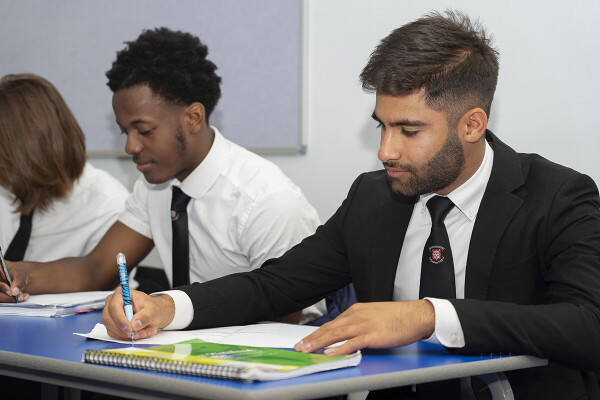
Figure 1: The “BA Way”
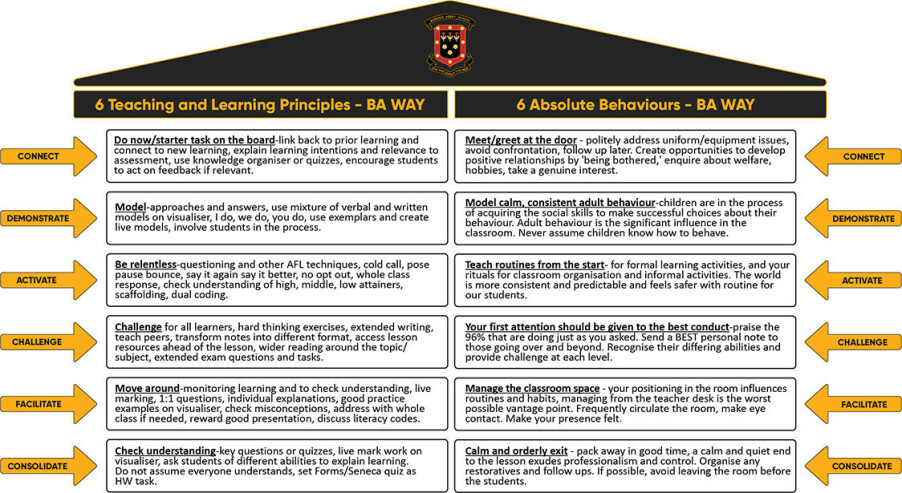
The BA Way
The BA Way is an evidence-based approach to great classroom practice. We looked at different models and used the work of Rosenshine, Sherrington and Lemov (among others) to develop the six Absolutes for the BA classroom. These do not lead to a checklist or tick box for a lesson visit. They are the Habits you would expect to see when delivering content over a few lessons as you build towards students working independently. This encourages departments and individual teachers to sequence their curriculum and weekly lessons towards an end goal of a test, task or assessment to check understanding.
Figure 2: BEST Habits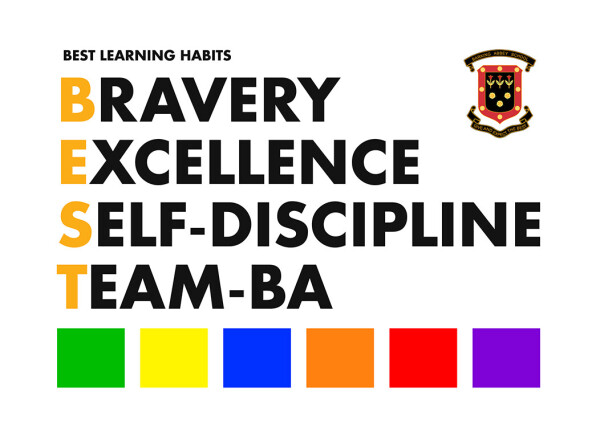
CURRICULUM IMPLEMENTATION
1. Primary to secondary transition
Barking Abbey has extremely close partnerships with its main Feeder Schools. Collaborative Projects in key curriculum areas including all Core subjects ensure progression from Key Stage 2 to 3 and beyond (see Appendix 1). We view our curriculum as a journey from Key Stage 2 to Year 13, with curriculum “building blocks” mapped to ensure student knowledge is deepened and long term.
“Students felt that they have built on their learning from primary, they expand their knowledge here and if they are revisiting KS2 curriculum topics this was only to touch base and move on to the KS3 curriculum.” (Peer Review Report).
2. KEY STAGE 3
Our Key Stage 3 Programme ensures pace, challenge and rigour for pupils at all starting points, whilst ensuring full coverage of the National Curriculum.
Following a full review of our Assessment and Reporting systems, a new Key Stage 3 programme was introduced in 2021-22 to demonstrate both attainment and progress of our students, and to provide them and their parents with clear targets for improvement. In addition to Core Subjects (English, Maths, Science, Computing and P.E.), pupils also study Geography, History, Art, Design Technology, Music, Religious Studies and a dedicated PDC lesson. The PSHE curriculum is constantly reviewed and updated; for example in response to Radicalisation of young people at a local mosque, and changing Sexual Harassment guidance.
Our curriculum is driven by our vision and values; Students complete their full national curriculum entitlement at Key Stage 3 in all subjects taught discretely (and includes Drama and Dance, which are non-Statutory). In addition, a large number of “Enrichment Clubs” are run at Key Stage 3 to provide engaging and challenging opportunities for our students (see Figure 3).
In addition to the taught curriculum, Key Stage 3 is used to launch the “Barking Abbey Way” to students, focused on the “BEST” Habits; this ensures that Culture Capital is embedded throughout the school ethos. BEST Habits are introduced during morning tutor time, assemblies and also embedded within the curriculum. In recognition of the need to support our students with Literacy, a partnership has been formed with Penguin Publishers and both School Libraries refurbished.
In response to feedback from Primary Feeder Schools, and Reading Age tests, the school added a Literacy lesson in Years 7 and 8 to support our students in catching up lost learning post-Pandemic. Curriculum time was created by introducing a carousel of Music, Drama and PDC (returning to a full timetable slot in Year 9):
|
SUBJECT |
LESSONS PER WEEK |
|
ENGLISH |
4 |
|
LITERACY |
1 (new model) |
|
MATHS |
4 |
|
SCIENCE |
4 |
|
P.E. |
2 |
|
GEOGRAPHY |
1 |
|
HISTORY |
1 |
|
COMPUTING |
1 |
|
FRENCH/ SPANISH |
2 |
|
R.E. |
1 |
|
TECHNOLOGY |
1 |
|
ART |
1 |
|
MUSIC* |
1 |
|
DRAMA* |
1 |
|
PERSONAL DEVELOPMENT CURRICULUM* |
1 |
|
|
26 |
Figure 3: Barking Abbey Enrichment Programme
3. KEY STAGE 4
The Key Stage 4 Curriculum enables Deep Learning to take place whilst preparing our pupils for their chosen post-16 pathways. As a result, our students make significantly more progress than their peers nationally.
Barking Abbey is committed to providing a wide, inclusive and flexible curriculum: 84% of Year 11 students sat 10+ qualifications (National 23%), and 67% sat 11+. Our passion for the Arts is maintained from Key Stage 3: in 2023 81 students studied Art/ Graphic Design; 20 Drama and 25 Dance in a state-of-the-art Studio.
85% Year 11 students studied Level 2 Citizenship: this is partly in response to Political Extremism in the local area, and ensures they develop as responsible citizens with a voice.
GCSE courses are currently offered in the following subjects: English Language, English Literature, Maths, Science (either Combined or Triple), Computer Science, ICT, French (and Spanish introduced), Geography, History, Religious Studies, Sociology, Engineering Products, Art, Graphic Design, Drama, Citizenship (through which PSHE is taught), Economics and Business Studies. In order to offer a vocational pathway, courses are offered in Hospitality, Health and Social Care, Sport, Dance and Music.
|
SUBJECT |
LESSONS PER WEEK |
|
ENGLISH |
4 |
|
MATHS |
4 |
|
SCIENCE |
4 |
|
COMPUTING |
2 |
|
CORE P.E. |
2 |
|
OPTION SUBJECTS |
3x3 |
|
|
25 |
4. KEY STAGE 5
The Sixth Form provides a wide range of subjects at GCE Advanced Level as well as vocational courses, including BTEC Level 3 in Business, Sport, ICT and Dance. In 2022 we introduced CTEC Applied Science in response to Student Voice. We have 3 internationally renowned Sports Academies: Basketball, Football and Netball. The percentage of our students staying into the Sixth Form is “Significantly Above National Average”. 188 of our Sixth Formers went on to study at University, including 132 to Russell Group and 6 on fully funded scholarships to the United States. In 2019, Barking Abbey had the most Apprenticeships of any State School in the Country.
“Students new to the sixth form commented on how welcoming, inclusive and diverse the community is”.
The vast majority of students choose 3 A-Level options, or a Vocational Level 3 equivalent. Following a comprehensive Curriculum Review, feedback from Higher Education partners, student voice and in light of the impacts of COVID lockdowns, in 2021-22 Barking Abbey moved to a 6-period model per subject. In addition, the remaining lessons are spent in our Sixth Form Study Centre completing Independent Learning.
“Sixth-form students are encouraged and supported to explore the careers and degrees of their choice”.
We have high expectations of every student and vary the level of challenge and support to ensure every child is encouraged to do their best. Where a student might have misunderstood a concept or be struggling to apply a skill, our teachers provide additional support in a variety of ways to help them make significant progress.
In 2021, Barking Abbey appointed a Director of Aspiration to further increase social mobility opportunities; the school has partnered with Chigwell and Woodford County High School to share Oxbridge expertise.
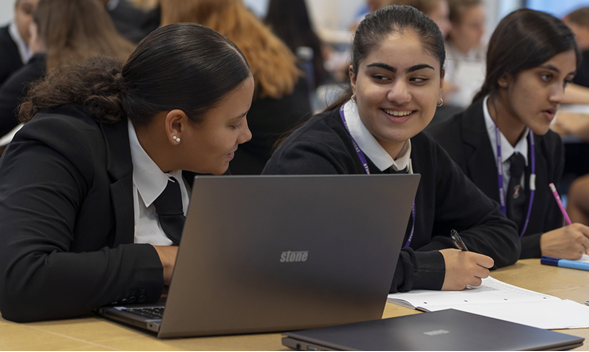
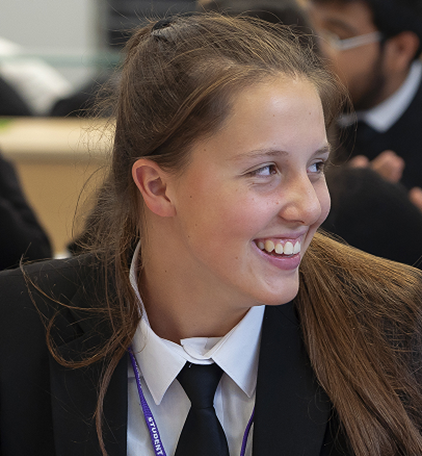
5. Monitoring the Curriculum
At Barking Abbey we use a Learning Review to monitor and improve the quality of the Teaching and Learning and curriculum delivery.
Learning Reviews focus on a year group at a time looking at the quality of teaching, the work produced by students in class and independently, the progress of classes and student voice. This is research led approach to meaningful lesson visits, reporting and improving pedagogy based mainly on the 2018 Sutton Trust ‘What Makes Great Teaching’ report. The Quadrant below highlights the process: 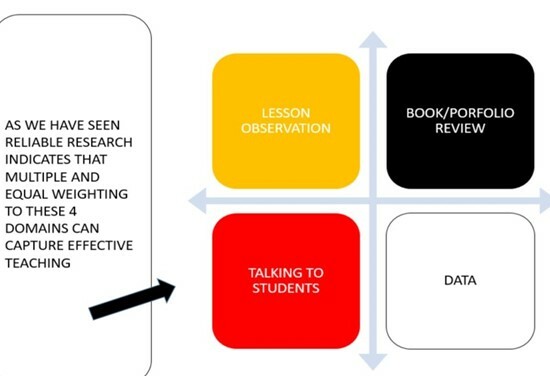
We also use some of our many partnerships to Quality Assure our Curriculum. These include the SPP Peer Review; John Daniell, HMI on behalf of Barking and Dagenham SIP; Malcolm Willis, School SIP and Ofsted Lead Inspector, and the Seven Kings Teaching Partnership. Our Lesson Visit proforma was designed following a research project with UCL IOE.
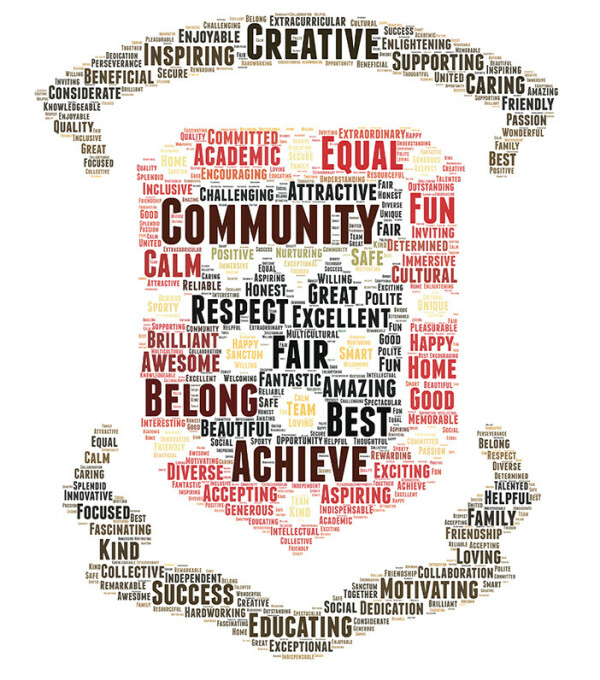
APPENDIX 1: CORE CURRICULUM PARTNERSHIP WITH MANOR JUNIOR SCHOOL
www.barkingabbeyschool.co.uk/home/curriculum/key-stage-2-to-3-curriculum-partnership/
|
Area of focus: |
Aim |
Partnership Strategies used or being used |
What we found |
Impact |
|
|
|
|
||||
|
Curriculum
Pedagogy
Student participation
|
Develop collaborative Key 2 to 3 links to inform curriculum delivery pedagogy and student participation
|
Curriculum Subjects: · Teacher meets · Shared curriculum plans/overview of curriculum maps · Joined up curriculum planning, · Collaborative materials shared, · Cross-over projects · Collation of samples of students work · Hosting remote and live lessons between schools, · Questionnaires/student voice · Running student events · Running student projects · Joint CPD sessions between schools
|
Maths: · Students confident sharing ideas but could see that language was an issue. Students couldn’t articulate what a “factor” or “multiple” was. · Students had difficulty applying knowledge of Factors and Multiples into other problems. · Students were given short tasks too complete at different levels of challenge, so they had the steps to build up to higher challenge.
English: · Identified student weaknesses, gaps in knowledge with Shakespeare, difficulty understanding language.
· Student gaps in knowledge, lacking skills of reading diverse authors
· Lack of students using techniques in creative writing was an EBI.
· Students didn’t have opportunity to read non-fiction texts
· Students only learn Shakespeare units in a very basic way/ simple overview.
· Students did not have strong knowledge of rigours of assessment.
· Successful interventions they do – Debate Mate
MFL: · Delivered KS2 French Schemes of work for years 3, 4, 5 and 6 (including Assessments, Key vocabulary and Teacher support) · Provided CPD / Training to non-specialist teachers in primary school · Modelled MFL teaching at Manor School · Lesson observations at BA (sharing ideas/good practice)
|
Maths: · We use examples and non-examples in our teaching to aid understanding · Taught Factors and Multiples as our first topic. · Added more discussion, challenge activities in Year 7 curriculum, especially work on number strategies. · Used ICCAMS as starting point in first few lessons to give teachers an insight to how the students think Mathematic
English: · Amended and modified Shakespeare units – Romeo and Juliet/ A Midsummer Night’s Dream consider more work on close language/ and quote analysis. Examples of scaffolding to model strong examples to stretch/ challenge More Able. Beginning year with Shakespeare which brings KS3 in line with KS4 and KS5.
· Teach more historical key figures, embedded the importance of BEST habits into ppts. Added a Black History Month unit for Y8. Added authors from BAME backgrounds into short units throughout Y7/Y8 LTPs, s that.
· Created ‘Reconnection unit’. Taught main skills needed in terms of techniques/ understanding.
· Developed students’ understanding of the play through close textual analysis. We have referenced GCSE texts to prepare students of what to expect in KS4.
· Changed sequencing of lessons – A Midsummer Night’s Dream now taught as the first unit in Year 7 instead of the last text.
· Simplified the assessment criteria and streamlined the way work is marked.
· Continued with popular Debate Mate club.
MFL:
· Curriculum content linkage between KS2 and KS3
· Differentiated lessons based on prior knowledge of KS2 work completed
Whole school: · Created a ‘closing the gap’ document that shared KS2 success strategies with BA staff, to apply into KS3 teaching and learning. · Uploaded borough primary TAGs onto teacher markbooks to ascertain Year 6 ability levels · Implementing internal reading tests and CATs tests for Year 7 & 8 · Created a transition link film for year 7 parents
|
|
|
|
|
General Transition:
· Linked up pastoral leads between the two schools. · BA Pastoral leads visit or meets with MJ students. · Effective pastoral practices in primary/secondary discussed and imbedded into each other’s transition program. · Collation of student information to inform planning, student profiles · Questionnaires/student voice gaging opinions on learning, worries, aspirations for incoming Year 7 students. · Virtual resources developed · Buddy system · Transition drama workshop about BA · Visits to the school prior to transition day · Q&A session for Year 6 about BA led by BA students |
|
General Transition:
· Ran physical transition workshops for vulnerable students, summer term. · Distributed out 4 parental transition newsletters, · Distributed out 5 student newsletters · Created virtual tours film for both campuses on website · Created a ‘meet your teachers’ film on school website · Run a 5-day, summer school in August · Created a transition task booklet to complete by students over the holiday · Created a transition capture spreadsheet , documenting primary students’ profile to enable cluster, form class dynamics.
|
|
|
|
|
|
|
|
|


